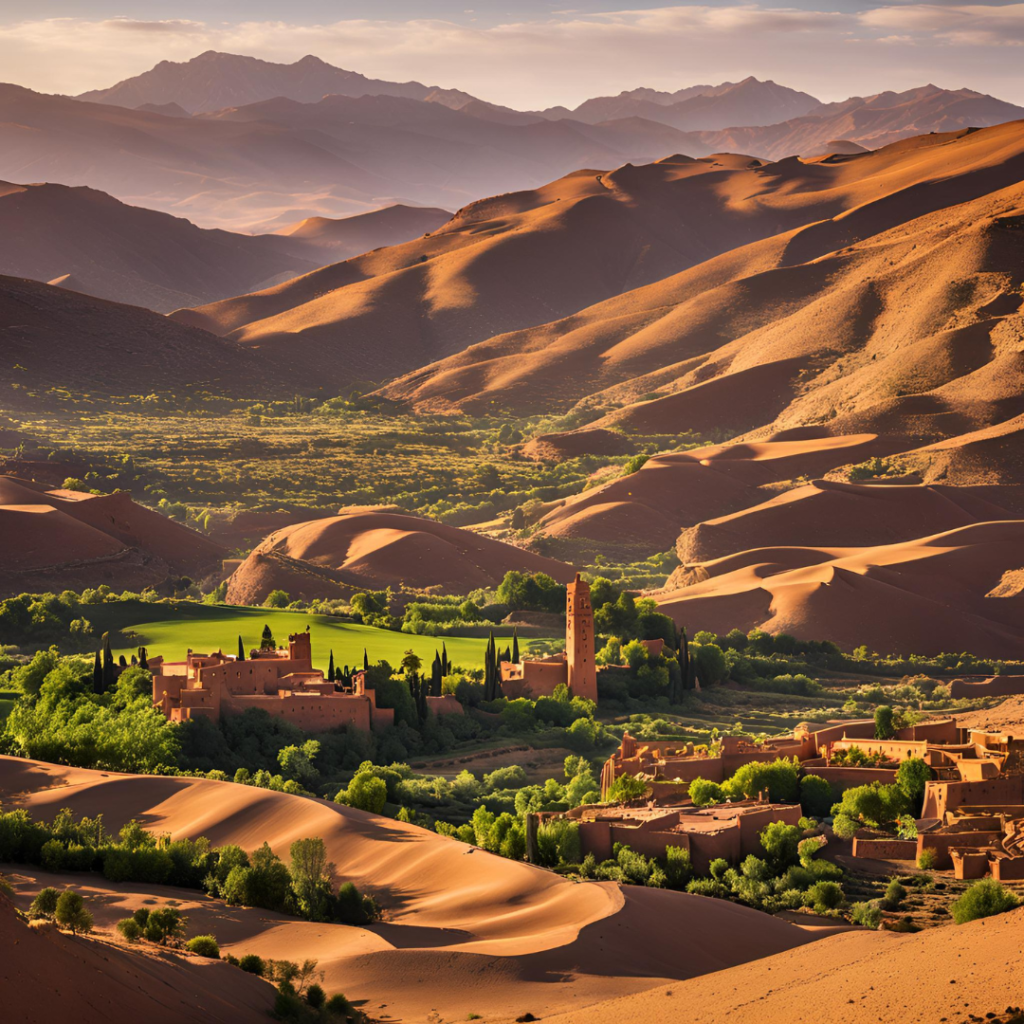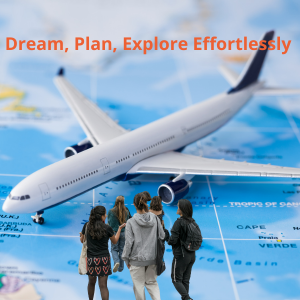Why Morocco is Perfect for a Road Trip
Morocco, a captivating land where ancient traditions intertwine with awe-inspiring landscapes, presents an unparalleled opportunity for road-tripping enthusiasts. From the vibrant souks of Marrakech to the mesmerizing golden dunes of the Sahara, and from winding mountain roads that carve through the Atlas ranges to serene coastal drives along the Atlantic, every element of a Moroccan road trip is a sensory delight. This enchanting country unlocks its soul through the freedom of the open road, allowing travelers to escape the tourist traps and delve deep into Morocco’s diverse beauty, rich culture, and hospitable spirit.
The Allure of Moroccan Road Trips
One of the most compelling reasons to consider a road trip in Morocco is the unparalleled freedom it brings. Unlike traditional guided tours confined to set itineraries, road trips grant travelers the opportunity to explore at their own pace, allowing for spontaneous detours and unplanned adventures. Imagine pursuing breathtaking sunrises over the expansive Sahara, pausing to savor local delicacies in quaint roadside cafes, or meandering through hidden Berber villages that dot the landscape. Each twist and turn in Moroccan roads unveils unexpected exhilaration—whether it’s stumbling upon a vibrant festival in a remote town or encountering a friendly local eager to share stories of their culture. With its well-connected highways and scenic backroads, self-driving in Morocco becomes not just a means of travel, but an exhilarating journey of exploration filled with countless potential.
Best Time to Embark on a Moroccan Road Trip
The optimal times for embarking on a Moroccan road trip are during the spring months of March to May and the autumn months of September to November. During these periods, the weather conditions are pleasantly mild, creating an ideal atmosphere for exploration. Summer can be blisteringly hot, especially in desert regions like Merzouga, where temperatures can soar above 100°F (38°C). Conversely, winter brings a different charm, as snowfall transforms the majestic Atlas Mountains into a winter wonderland. Regardless of the season, Morocco unfolds a unique beauty all its own. During springtime, the landscape blooms with wildflowers, while autumn sees the leaves turning shades of amber and gold, painting picturesque vistas that invite travelers to stop and reflect.
Essential Travel Documents and Requirements
Travelers planning a road trip in Morocco should ensure they have the necessary travel documents in order. A valid passport is crucial, and depending on your nationality, a visa may also be required. It is advisable to check the latest entry requirements based on your country of origin. An international driving permit (IDP) is recommended for those planning to rent a vehicle, though many agencies accept foreign licenses as well. Additionally, travelers should not overlook car insurance—having comprehensive coverage is highly advisable, as it provides peace of mind on the road.
Choosing the Right Vehicle for the Journey
When it comes to selecting the right vehicle for a Moroccan road trip, the choice largely depends on your intended route. For urban and highway travel, a compact car is sufficient, enabling ease of maneuvering through congested city streets. However, if your plans include venturing into the Sahara Desert, the towering peaks of the High Atlas, or rural areas with less developed roads, a 4×4 is essential. Rental companies such as Hertz, Avis, and numerous local agencies offer a variety of options suitable for different travel needs and budgets. Before embarking on your journey, it’s wise to inspect your vehicle thoroughly to ensure it meets your requirements, including checking tire conditions, fuel levels, and ensuring that spare tires and tools are included in the vehicle.
Iconic Moroccan Road Trip Routes
Morocco is replete with iconic road trip routes that present diverse narratives spanning culture, history, and natural beauty:
- The Atlantic Coastal Drive: This stunning route stretches from Casablanca to Essaouira, ideal for ocean lovers. Travelers can enjoy dramatic coastal views, charming fishing villages, and the enticing aroma of fresh seafood wafting from beachside eateries.
- The Atlas Mountain Escape: This winding drive from Marrakech to Ouarzazate takes you through breathtaking valleys dotted with ancient kasbahs. The rugged landscapes, terraced fields, and friendly Berber residents add layers to your understanding of Moroccan heritage.
- The Sahara Adventure: This mesmerizing journey leads drivers towards the golden dunes of Merzouga, where the undulating sands meet expansive skies. Sunset camel treks, starlit nights, and traditional Berber music enrich the experience as you immerse yourself in desert life.
- The Imperial Cities Circuit: Delve into Morocco’s cultural essence by driving through key imperial cities like Fez, Meknes, and Rabat. Each city boasts its own compelling history, and travelers can uncover ancient medinas, majestic palaces, and significant landmarks along the way.
Road Conditions and Driving Tips in Morocco
Moroccan highways are generally well-maintained and offer smooth traveling experiences. However, rural roads can present a different challenge as they may feature occasional potholes and fluctuating levels of traffic that can be unpredictable. As a driver in Morocco, it’s important to remember that driving is on the right side of the road, and road signs are primarily noted in Arabic and French. Hence, having basic knowledge of these languages can enhance your navigation experience.
Here are several essential driving tips for a more seamless journey:
- Defensive Driving: Being vigilant and defensive while driving is crucial, especially in bustling cities like Marrakech or Casablanca. Anticipate the actions of fellow drivers and pedestrians, as local driving habits might differ significantly from what you’re accustomed to.
- Observe Speed Limits: Speed limits are strictly enforced, and while they can vary from urban areas to remote settings, it’s always a good idea to adhere to the posted signs. Authorities may set up checkpoints, especially for speed enforcement.
- Navigational Aids: Consider utilizing GPS systems or navigation apps on your smartphone, which can guide you and help identify attractions along the way. Offline maps might be handy as well, especially in areas with limited internet connectivity.
Fueling Up: Where to Find Gas Stations
In Morocco, fuel stations are abundant in cities like Marrakech, Fes, and Casablanca, making it easy to fill up before hitting the open road. However, fuel availability can be sporadic in remote areas and along less-traveled routes, so it’s wise to refuel before embarking on lengthy stretches through the desert or rugged terrains. Generally, gas stations accept both cash and card payments, though visiting those in larger cities may offer smoother payment processes. As a precaution, carrying some cash is advisable, particularly if you plan to visit more secluded destinations where credit card facilities might not be available.
Accommodation Options Along the Journey
Morocco offers a vast range of accommodation options to suit every budget and style. For travelers seeking luxury, various riads throughout the country provide opulent experiences characterized by intricate designs and personalized service. Budget-minded travelers can find a plethora of hostels and guesthouses that offer comfortable lodgings without breaking the bank. For those looking for a unique experience, desert camps provide an unforgettable way to immerse oneself in the Sahara; stargazing in the clear desert skies and enjoying traditional meals around the campfire highlight the experience. Camping is also an exciting option for adventurous souls, with beautiful landscapes available near mountains and beaches.
Experiencing Moroccan Culture on the Road
One of the most compelling aspects of a Moroccan road trip is the opportunity to connect with the rich cultural experiences along the way. Markets, known as souks, brim with handcrafted goods ranging from colorful textiles to intricate pottery. Roadside vendors serve local delicacies that tantalize the taste buds and invite travelers to explore regional culinary traditions. Taking the time to stop in small villages offers a genuine glimpse into Berber life, where age-old customs thrive amidst modern influences. Engaging with locals, participating in traditional music and dance, and savoring authentic Moroccan hospitality can create lasting memories during your journey.
Must-Try Moroccan Roadside Delicacies
During your travels, be sure to indulge in some of Morocco’s must-try roadside delicacies that define the culinary landscape. Slow-cooked tagine, a fragrant stew prepared with various meats and vegetables, encapsulates the essence of Moroccan flavors. Pairing it with fluffy, aromatic couscous creates a winning combination that reflects the country’s agricultural richness. Fresh dates from the oases are not only delicious but also provide a natural energy boost for long drives. While on the road, stopping at small cafes to savor traditional mint tea—a quintessential symbol of Moroccan hospitality—will enhance your experience of the local culture.
Safety Considerations for a Hassle-Free Trip
To ensure a hassle-free journey, it is essential to be mindful of safety considerations while on the road. Since roadside assistance is limited in rural areas, it is wise to carry a spare tire, basic tools, and a first-aid kit. Checking the weather forecast before embarking on your journey can help you prepare for unexpected conditions, particularly in mountainous regions where weather could change rapidly. Additionally, night driving in rural areas is not advisable due to unlit roads and the possibility of encountering animals crossing the road.
Language and Communication on the Road
Arabic and French are the two most widely spoken languages in Morocco. Having a few basic phrases memorized or using a translation app can significantly enhance your travel experience by helping you engage with locals effectively. Learning simple greetings such as “Salam” (Hello) and “Shukran” (Thank you) fosters goodwill and opens doors to richer interactions. Additionally, locals often appreciate your efforts to speak their language, which can lead to unforgettable exchanges and insights into their culture.
Packing Essentials for a Moroccan Road Trip
When preparing for a Moroccan road trip, it’s essential to pack thoughtfully for the varying climate and needs you may encounter. Layers are crucial due to temperature shifts, as the mornings and evenings can be quite cool, especially in mountainous regions, while midday temperatures can soar in the desert. Aim to pack breathable clothing that can be layered effectively.
In addition to clothing, essential items to include are:
- Comfortable Footwear: Ideal for exploring both urban areas and natural landscapes. Sturdy shoes are particularly useful for hiking in the Atlas Mountains or walking through sandy desert terrains.
- A Good Map or GPS Device: While technology often serves us well, having a physical map can be a reliable backup, particularly in remote areas with limited internet connectivity.
- First-Aid Kit: This should include basic supplies for minor injuries, medications, and any personal prescriptions that you might need during your trip.
- Reusable Water Bottle: Hydration is vital, especially in warmer regions. Bringing a refillable water bottle can help you stay hydrated while minimizing plastic waste.
- Sun Protection: Sunscreen, sunglasses, and a wide-brimmed hat are indispensable when exploring the outdoors.
- Camera: To capture the stunning landscapes and memorable moments of your journey through Morocco.
Exploring Morocco’s Natural Wonders
Morocco is a country rich in natural beauty, providing an array of opportunities for exploration. Starting with the dramatic Todra Gorges, known for their sheer rock faces that rise hundreds of meters high, these canyons offer breathtaking scenery and are popular among climbers and nature enthusiasts alike.
Another remarkable natural feature is the Dades Valley, sometimes referred to as the “Valley of a Thousand Kasbahs,” where verdant valleys contrast with rugged mountain landscapes. Explore the delightful Berber villages and take in the stunning views throughout the winding roads.
In the desert, Merzouga stands out with its towering dunes, offering incredible scenic vistas and opportunities for activities like camel trekking, sandboarding, and stargazing at night when the sky is illuminated by countless stars.
Additionally, the Souss-Massa National Park is a haven for wildlife enthusiasts and bird watchers, home to a plethora of species and unique landscapes that exemplify Morocco’s ecological diversity.
Budgeting for a Moroccan Road Trip
Budgeting for your road trip in Morocco can vary widely based on your travel style and preferences. Here are some key budgeting considerations:
- Accommodation Costs: Prices can range significantly—luxurious riads may charge upwards of $150 per night, while budget hotels or hostels can around $20-$50.
- Food Expenses: Eating at local restaurants or street vendors can be incredibly affordable, with meals costing as little as $3 to $10.
- Fuel Prices: Fuel costs can vary, but as of recent trends, prices should be budgeted at approximately $1.30 to $1.50 per liter. It’s wise to account for the distances you plan to travel.
- Activities and Entrance Fees: Factor in the costs of any excursions, such as guided tours, entrance fees to historical sites, or activities such as camel rides.
- Miscellaneous Expenses: Always reserve a portion of your budget for souvenirs, snacks, and unexpected expenses that may arise during your travels.
Hidden Gems to Discover
Morocco is a land full of surprises, offering hidden gems off the beaten path. Consider visiting Chefchaouen, the blue-hued city, famous for its stunning architecture and vibrant blue streets, perfect for photography and leisurely exploration.
Additionally, Asilah, a coastal town with stunning beaches and charming murals, is worth a stop for its vibrant arts scene and laid-back atmosphere. The town hosts cultural festivals throughout the summer, providing a unique glimpse into local traditions.
Don’t miss Ait Benhaddou, a UNESCO World Heritage Site that boasts ancient clay architecture and has served as a backdrop for numerous films. The picturesque kasbah is easily accessible from Ouarzazate, making it a convenient stop on your journey.
Respecting Local Culture and Customs
When traveling through Morocco, it’s essential to be mindful of local customs and cultural norms. Moroccan society is predominantly Muslim, so dressing modestly is highly recommended, particularly in rural areas and when visiting religious sites.
In public places, strive to exhibit respectful behavior; when greeting locals, observe how they interact and follow their lead. Furthermore, if you wish to take photos of individuals or their property, it’s courteous to ask for permission first, as many prefer to maintain their privacy.
Fostering intercultural understanding enhances your travel experience, allowing you to build rapport with locals and gain deeper insights into their lifestyles and values.
Environmental Considerations
As you embark on your Moroccan road trip, being environmentally conscious is paramount. With increasing tourism, it’s essential to practice sustainable travel habits to preserve Morocco’s natural beauty for future generations. Some tips include:
- Reduce Plastic Waste: Opt for reusable bags and water bottles instead of single-use plastic. Many towns have accessible water refill stations.
- Respect Wildlife: While exploring national parks and natural reserves, maintain a respectful distance from animals and avoid feeding them. This ensures their safety and well-being as well as the integrity of their habitats.
- Stay on Designated Paths: When hiking or exploring nature, stick to marked trails to prevent erosion and damage to fragile ecosystems. This practice helps to preserve the unique flora and fauna native to the region.
- Support Local Economies: Whenever possible, purchase goods from local artisans and markets. This practice not only supports local economies but also promotes sustainable tourism, ensuring that the benefits of your visit reach the communities you engage with.
- Minimize Energy Use: Be conscious of your energy consumption by turning off air conditioning or heating when not in use, and maximizing natural light instead. In accommodations, try to reduce waste by recycling and using resources sparingly.
Conclusion
Embarking on a road trip through Morocco is more than just a journey from one point to another; it is a transformative experience that allows you to delve into the heart and soul of a nation steeped in rich history and cultural diversity. With open roads stretching before you, each turn reveals new adventures waiting just around the corner—from the majestic mountains and sprawling deserts to the inviting coasts and vibrant cities.
Throughout your travels, you will encounter a tapestry of landscapes, hear stories from welcoming locals, and indulge in the delightful flavors of Moroccan cuisine. Amidst this exploration, you will also find moments to reflect on the beauty of human connection and the importance of cultural respect.
So pack your bags, choose your route, and get ready to explore Morocco’s hidden treasures on a road trip that promises to be filled with unforgettable memories. Adventure awaits at every turn, beckoning you to discover the magic that lies within this extraordinary country.



